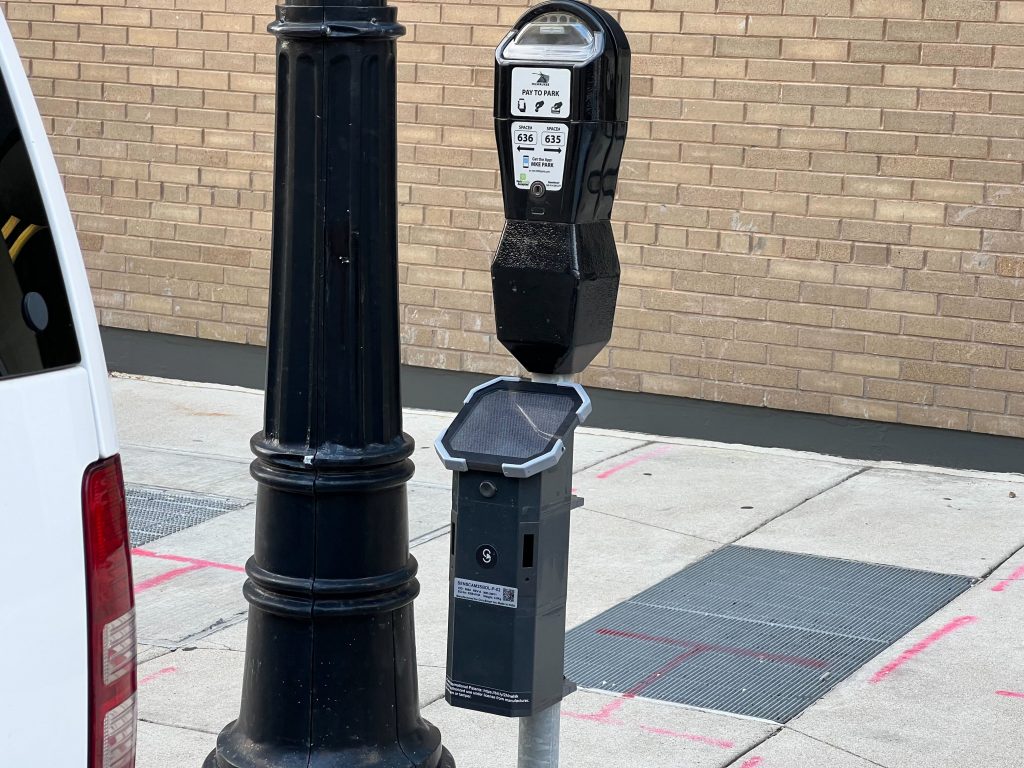New Sensors Quietly Measure How Often Parking Spots Used
City could use information to reset parking meters, charge variable rates.
New rectangular boxes have appeared Downtown beneath parking meters and street signs along N. Milwaukee Street.
They’re not a high-tech parking meter the city is planning to switch to, but part of an attempt to get a better understanding of how city parking spaces are being used.
Known as “Vehicle Detection Sensors,” the patented devices are produced by Milwaukee-based CivicSmart.
“[The sensors] are currently being installed in several locations within the City as part of a pilot program to assess the accuracy of the vehicle detection associated with them,” said a Department of Public Works spokesperson.
The devices are intended to wirelessly report space utilization to the city, giving more information than could be gained by how much money the metered parking space generated. According to CivicSmart’s website, the devices rely on radio waves and as a result, “detection is not affected by conditions that plague other sensor technologies (ambient light, color, weather, passing or adjacent vehicles, and electromagnetic interference).”
The city is initially testing the sensors for their accuracy. It is paying $245 per sensor for up to 75 sensors during the pilot phase. The city’s cost covers one-third of the estimated cost of the sensors. “The second phase, for which the time frame has not yet been determined, is planned for up to 125 additional sensors. The length of the pilot also has not yet been determined, and will be dependent on a variety of factors,” said a DPW spokesperson.
The data collected, according to CivicSmart, could be used to inform people where empty spaces are, increase parking revenue by resetting parking meters when a vehicle leaves, provide free time for vehicles in certain spaces, offer space reservations, improve enforcement by merging vehicle presence with meter information and enable variable pricing based on actual demand. The sensors also have the capability to read an RFID chip, making them compatible with a windshield-mounted permit.
The Common Council approved a market-based (variable) block-by-block parking pricing strategy in 2018, but short of increasing rates during events near Fiserv Forum, DPW has yet to implement the policy. The strategy was intended to raise rates when blocks were found to have utilization and lower rates when utilization was low, with the end goal of making it easier to park by appropriately pricing spaces in a way that would likely raise rates in some areas while dropping rates or eliminating restrictions altogether in other areas. Additional details on the strategy, and a proposal to extend the meter hours can be found in our March 2 coverage.
CivicSmart is the parent company of Duncan Parking Technologies. It acquired the parking company in 2015 from Duncan Solutions, Inc., which manages parking tickets for the City of Milwaukee.
If you think stories like this are important, become a member of Urban Milwaukee and help support real, independent journalism. Plus you get some cool added benefits.
Transportation
-
Congestion Pricing Cuts Air Pollution in New York City
 Dec 14th, 2025 by Jeff Wood
Dec 14th, 2025 by Jeff Wood
-
FTA Tells Milwaukee to Crack Down on Fare Evasion — Even Where Fares Don’t Exist
 Dec 12th, 2025 by Graham Kilmer
Dec 12th, 2025 by Graham Kilmer
-
Will GOGO’s Bus Service Ever Get Going?
 Dec 9th, 2025 by Jeramey Jannene
Dec 9th, 2025 by Jeramey Jannene






















Needing a reservation to park is a terrible idea. 1st come, 1st served!”
Easier to park? More revenue? I call it exploiting the people of Milwaukee, We already pay the city and county “wheel tax.” Just how many nickel and dime taxes do we pay? Counting telecoms, and utilities and the like I would guess about 20. You will not hear any candidates for office in Milwaukee discuss this. What you will hear is talk about how more taxes makes people happier and other such nonsense.
I have a better idea. People who live in Milwaukee can park for two hours free. The city has everyone’s car info from the Wheel Tax.